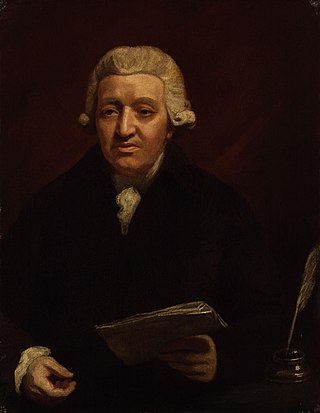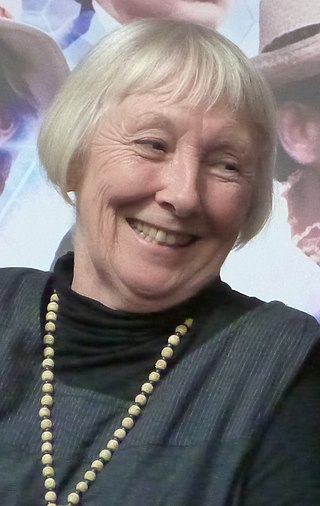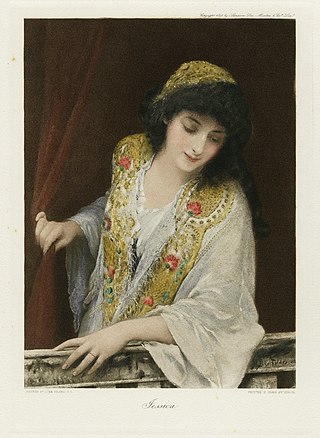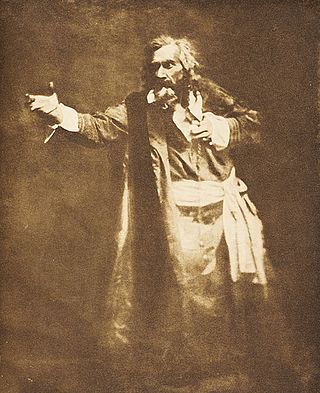
The Merchant of Venice is a play by William Shakespeare, believed to have been written between 1596 and 1598. A merchant in Venice named Antonio defaults on a large loan taken out on behalf of his dear friend, Bassanio, and provided by a Jewish moneylender, Shylock, with seemingly inevitable fatal consequences.

Mercy is benevolence, forgiveness, and kindness in a variety of ethical, religious, social, and legal contexts.

Charles Macklin, , was an Irish actor and dramatist who performed extensively at the Theatre Royal, Drury Lane. Macklin revolutionised theatre in the 18th century by introducing a "natural style" of acting. He is also famous for accidentally killing a man during a fight over a wig at the same theatre.

Maureen O'Brien is an English actress and author best known for playing the role of Vicki Pallister in the BBC science fiction television series Doctor Who, although she has appeared in many other television programmes.
"A Quality of Mercy" is episode 80 of the American television anthology series The Twilight Zone, which originally aired on December 29, 1961. The title is taken from a notable speech in William Shakespeare's The Merchant of Venice, quoted in Serling's closing narration at the end of the episode.

The Merchant of Venice is a 2004 romantic drama film based on William Shakespeare's play. It is the first full-length sound film in English of Shakespeare's play—other versions are videotaped productions that were made for television, including John Sichel's 1973 version and Jack Gold's 1980 BBC production.

Portia is a female protagonist in The Merchant of Venice by William Shakespeare. In creating her character, Shakespeare drew from the historical figure of Porcia — the daughter of Cato the Younger — as well as several parts of the Bible.
The letter of the law and the spirit of the law are two possible ways to regard rules or laws. To obey the letter of the law is to follow the literal reading of the words of the law, whereas following the spirit of the law is to follow the intention of why the law was enforced. Although it is usual to follow both the letter and the spirit, the two are commonly referenced when they are in opposition. "Law" originally referred to legislative statute, but in the idiom may refer to any kind of rule. Intentionally following the letter of the law but not the spirit may be accomplished by exploiting technicalities, loopholes, and ambiguous language.

Antonio is one of the central characters in William Shakespeare's play The Merchant of Venice. He is portrayed as a wealthy and respected merchant residing in Venice, known for his generosity and melancholic disposition. Antonio is a close friend of Bassanio, another important character in the play, and their element of the story.
The Maori Merchant of Venice is a 2002 New Zealand drama film in the Māori language, directed by Don Selwyn.
The Merchant of Venice is a 1916 British silent drama film directed by Walter West and starring Matheson Lang, Hutin Britton, Ernest Caselli. It is an adaptation of William Shakespeare's play The Merchant of Venice.

The Merchant of Venice is a 1923 German silent drama film directed by Peter Paul Felner and starring Werner Krauss, Henny Porten and Harry Liedtke. The film is an adaptation of William Shakespeare's play The Merchant of Venice. It was released in the United States in 1926 as The Jew of Mestri. The film was made on location in Venice, with scenes and characters added which were not in the original play. This is the surviving copy, being two reels shorter than the German version. The characters in the German retained Shakespeare's nomenclature, but in the American they were given new names sourced from the Italian work Il Pecorone, a 14th-century short story collection attributed to Giovanni Fiorentino, from which Shakespeare is believed to have drawn his idea. The film purports to be a return to the original, as an excuse for its differences from the play.
According to Dr. Naseeb Shaheen, Shakespeare, in writing his plays, "seldom borrows biblical references from his sources, even when those sources contain many references." Roy Battenhouse notes that the Shakespearean tragedy "frequently echoes Bible language or paradigm, even when the play's setting is pagan." Similarly, Peter Milward notes that despite their secular appearance, Shakespeare's plays "conceal an undercurrent of religious meaning which belongs to their deepest essence." Further, Milward maintains that although Shakespeare "may have felt obliged by the circumstances of the Elizabethan stage to avoid Biblical or other religious subjects for his plays," such obligation "did not prevent him from making full use of the Bible in dramatizing his secular sources and thus infusing into them a Biblical meaning." Milward continues that, in writing his plays, Shakespeare "shows the universal relevance of the Bible both to the reality of human life 'in this harsh world' and to its ideal in the heart of God." Steven Marx suggests "a thorough familiarity with the Scriptures" is a prerequisite to understanding the Biblical references in the plays, and that the plays' references to the Bible "illuminate fresh and surprising meanings in the biblical text." Marx further notes that "it is possible that Shakespeare sometimes regarded his own role of playwright and performer as godlike, his own book as potent and capacious as 'The Book'." It is important to note, as a recent study points out “The diversity of versions reflected in Shakespeare’s writing indicates that ‘Shakespeare’s Bible’ cannot be taken for granted as unitary, since it consists of a network of different translations”

"May God have mercy upon your soul" or "may God have mercy on your soul" is a phrase used within courts in various legal systems by judges pronouncing a sentence of death upon a person found guilty of a crime that carries a death sentence. The phrase originated in beth din courts in the Kingdom of Israel as a way to attribute God as the highest authority in law. The usage of the phrase later spread to England and Wales' legal system and from there to usage throughout the colonies of the British Empire whenever a death sentence was passed.

Shylock is a fictional character in William Shakespeare's play The Merchant of Venice. A Venetian Jewish moneylender, Shylock is the play's principal villain. His defeat and forced conversion to Christianity form the climax of the story.

The Merchant of Venice is a 1961 Australian television adaptation of the play by William Shakespeare that aired on 13 September 1961 in Sydney, and on 25 October 1961 in Melbourne.

Jessica is the daughter of Shylock, a Jewish moneylender, in William Shakespeare's The Merchant of Venice. In the play, she elopes with Lorenzo, a penniless Christian, and a chest of her father's money, eventually ending up in Portia and Bassanio's household. In the play's dramatic structure, Jessica is a minor but pivotal role. Her actions motivate Shylock's vengeful insistence on his "pound of flesh" from Antonio; her relationships with Lorenzo and Shylock serve as a mirror and contrast to Portia's with Bassanio and with her father; her conversion to Christianity is the end of Shylock's line's adherence to the Jewish faith.

The Merchant is a 1976 play in two acts by the English dramatist Arnold Wesker. It is based on William Shakespeare's The Merchant of Venice, and focuses on the Jewish Shylock character, that play's principal antagonist.
Bassanio is a fictional character in Shakespeare's The Merchant of Venice.

Charles Macklin as Shylock is a c.1768 oil painting by the German-born British artist Johan Zoffany. A conversation piece, it features a group portrait painting of actors performing the courtroom scene in William Shakespeare's The Merchant of Venice.